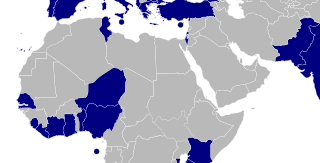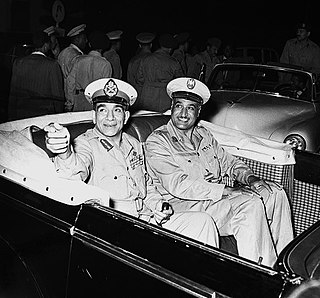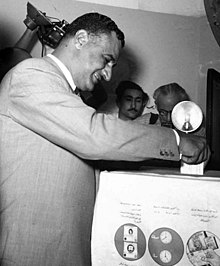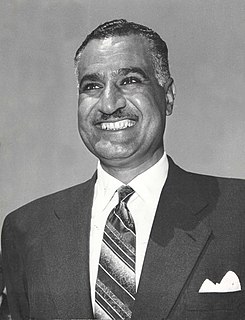
The politics of Egypt is based on republicanism, with a semi-presidential system of government, established following the Egyptian Revolution of 2011, and the resignation of President Hosni Mubarak. The President of Egypt is elected for a maximum of two four-year terms and the Parliament is unicameral and unbiased. The President can appoint up to 5% of the total number of seats in Parliament, and can also dissolve it. Parliament can also impeach the President. Egypt was traditionally ruled by royals until 1952, but the first free elected President was in 2006. The Parliament of Egypt is the oldest legislative chamber in Africa and the Middle East.

The United Arab Republic was a sovereign state in the Middle East from 1958 to 1971. It was initially a political union between Egypt and Syria from 1958 to until Syria seceded from the union after the 1961 Syrian coup d'état, leaving a rump state, while Egypt continued to be known officially as the United Arab Republic until 1971.

Elections in Egypt are held for the President and a unicameral legislature. The President of Egypt is elected for a four-year term by popular vote.

Elections in Rwanda take place within the framework of a multi-party democracy and a presidential system. The President and majority of members of the Chamber of Deputies are directly elected, whilst the Senate is indirectly elected and partly appointed.

The National Democratic Party, often simply called in Arabic: الحزب الوطني Al-Ḥizb al-Waṭaniy – the "National Party", was an Egyptian political party. It was founded by President Anwar El Sadat in 1978.

According to the Democracy Index 2016 study, Israel is the only democracy in the Middle East, while Tunisia is the only democracy in North Africa. The measure of the level of democracy in nations throughout the world published by Freedom House and various other freedom indices, the Middle Eastern and North African countries with the highest scores are Israel, Tunisia, Turkey, Lebanon, Morocco, and Kuwait. Countries that are occasionally classified as partly democratic are Egypt and Iraq. The remaining countries of the Middle East are categorized as authoritarian regimes, with the lowest scores held by Saudi Arabia and Yemen.

Kefaya is the unofficial moniker of the Egyptian Movement for Change, a grassroots coalition which prior to the 2011 revolution drew its support from across Egypt's political spectrum. It was a platform for protest against Hosni Mubarak's presidency and the possibility he might seek to transfer power directly to his son Gamal; political corruption and stagnation; "the blurring of the lines between power and wealth; and the regime's cruelty, coercion and disregard for human rights."

The Federation of Arab Republics was an attempt by Muammar Gaddafi to merge Libya, Egypt and Syria in order to create a United Arab state. Although approved by a referendum in each country on 1 September 1971, the three countries disagreed on the specific terms of the merger. The federation lasted from 1 January 1972 to 19 November 1977.
The History of the Muslim Brotherhood in Egypt (1939–1954) discusses the History of the Muslim Brotherhood in Egypt from its actions during World War II to its official dissolution by the Egyptian government.

Nasserism is a socialist Arab nationalist political ideology based on the thinking of Gamal Abdel Nasser, one of the two principal leaders of the Egyptian revolution of 1952 and Egypt's second President. Spanning the domestic and international spheres, it combines elements of Arab socialism, republicanism, nationalism, anti-imperialism, developing world solidarity and international non-alignment. In the 1950s and 1960s, Nasserism was amongst the most potent political ideologies in the Arab world. This was especially true following the Suez Crisis of 1956, the political outcome of which was seen as a validation of Nasserism and a tremendous defeat for Western imperial powers. During the Cold War, its influence was also felt in other parts of Africa and the developing world, particularly with regard to anti-imperialism and non-alignment.

The Egyptian coup d'état of 1952, also known as the 1952 Coup d'état or July 23 revolution, began on July 23, 1952, by the Free Officers Movement, a group of army officers led by Mohammed Naguib and Gamal Abdel Nasser. The coup was initially aimed at overthrowing King Farouk.

The definition and application of secularism, especially the place of religion in society, varies among Muslim countries as it does among western countries. Secularism is often used to describe the separation of public life and civil/government matters from religious teachings and commandments, or simply the separation of religion and politics. Secularism in Muslim countries is often contrasted with Islamism, and secularists tend to seek to promote secular political and social values as opposed to Islamic ones. Among western scholars and Muslim intellectuals, there are some debates over secularism which include the understanding of political and religious authorities in the Islamic world and the means and degree of application of sharia in legal system of the state.
The Democratic Movement for National Liberation was a communist organization in Egypt from 1947 to 1955. HADITU was led by Henri Curiel. The movement followed the line of the National Democratic Revolution.

The history of the Arab Republic of Egypt spans the period of modern Egyptian history from the Egyptian Revolution of 1952 to the present day, which saw the toppling of the monarchy of Egypt and Sudan, the establishment of a presidential republic, and a period of profound economic, and political change in Egypt, and throughout the Arab world. The abolition of a monarchy and aristocracy viewed widely as sympathetic to Western interests, particularly since the ousting of Khedive Isma'il Pasha, over seven decades earlier, helped strengthen the authentically Egyptian character of the republic in the eyes of its supporters. From then until now Egypt has always been an independent country.

A referendum on the United Arab Republic was held in Egypt on 21 February 1958, alongside a simultaneous referendum in Syria. The referendum consisted of two questions; one on the formation of the UAR, and the other on Gamal Abdel Nasser's candidacy for the post of President of the UAR. Both were approved, with fewer than 300 votes against and a 98.1% voter turnout.
The Unified Egyptian Communist Party was a political party in Egypt. The party was founded in February 1955 through the merger of the Democratic Movement for National Liberation (HADITU) and six splinter organizations. The talks regarding the merger were held without the HADITU leader Henri Curiel being aware of them. Once the merger was finalized Curiel and HADITU leader Kamal Abd al-Halim were excluded from membership in the new party. Curiel and Abd al-Halim were allowed to enter the party in 1956, and after the 1956 war Curiel was included in its Central Committee.

The history of Egypt under Gamal Abdel Nasser covers the period of Egyptian history from the Egyptian revolution of 1952, of which Gamal Abdel Nasser was one of the two principal leaders, spanning Nasser's presidency of Egypt from 1956, to his death in 1970. Nasser's tenure as Egypt's leader heralded a new period of modernisation and socialist reform in Egypt and a staunch advocacy of pan-Arab nationalism and developing world solidarity. His prestige in Egypt and throughout the Arab world soared in the wake of his nationalisation of the Suez Canal in 1956, and Egypt's political victory in the subsequent Tripartite Aggression, but was damaged badly by Israel's successful invasion and occupation of Egyptian and Arab territory in the Six-Day War of 1967.

Diaa al-Din Dawoud was an Egyptian politician and activist. He is the founder of the Arab Democratic Nasserist Party, serving as its secretary-general between 1992 and November 2010.


















